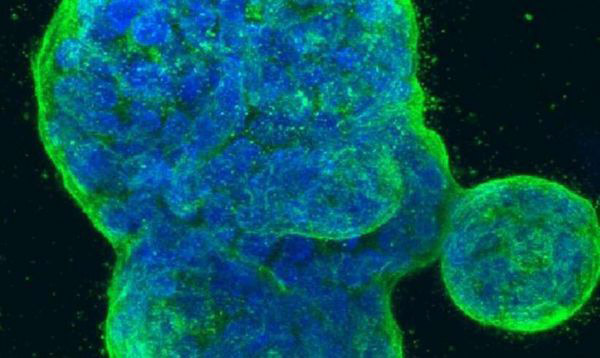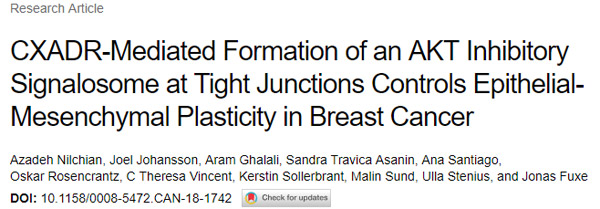Changes in the identity of breast cancer cells or causes them to be invasive
November 30, 2018 Source: Ministry of Science and Technology
Window._bd_share_config={ "common":{ "bdSnsKey":{ },"bdText":"","bdMini":"2","bdMiniList":false,"bdPic":"","bdStyle":" 0","bdSize":"16"},"share":{ }};with(document)0[(getElementsByTagName('head')[0]||body).appendChild(createElement('script')) .src='http://bdimg.share.baidu.com/static/api/js/share.js?v=89860593.js?cdnversion='+~(-new Date()/36e5)];
Recently, researchers at Karolinska Institute in Sweden identified a protein that can determine the identity and invasiveness of breast cancer cells. This finding has helped to develop new therapies and diagnostic strategies that target the aggressiveness and metastasis of breast cancer. The research has recently been published in Cancer Research.

The invasion of cancer cells into surrounding tissues is the first step in metastasis, and cancer metastasis is also the leading cause of cancer death. Researchers are not fully aware of how cancer cells become invasive and metastatic, and therefore lack treatment for patients with metastatic cancer. This new study provides new ideas for this area.
Jonas Fuxe, assistant research professor at the Department of Microbiology, Tumor and Cell Biology at Karolinska Institute, said: "In recent years, there has been increasing evidence that changes in the identity of cancer cells may have caused them to The causes of invasiveness and transfer behavior."
Researchers have long believed that the identity of cells formed during embryonic development is a permanent feature. Therefore, once a cell is designated as a particular type of cell, it will remain this type, such as muscle cells, nerve cells, or skin cells.
Now researchers have found that cell identity is not static, and cell identity changes, such as cancer, under certain pathological conditions. Cancer cells are mainly derived from an epithelial cell from the inner wall of a subcutaneous tubular organ or the inner surface of a gland (mammary gland). Recent studies have shown that breast cancer cells may lose their epithelial cell identity and acquire invasive and metastatic properties through an epithelial-mesenchymal transition (EMT) process.
Fuxe said: "The induction of EMT is a special process, just like a ship parked in a port unfastens the rope from the anchor point and prepares to start. This involves a protein called CXADR (or CAR). CXADR originally It is considered to be a viral receptor, but we have not fully understood its normal function. CXADR is usually missing during the transition of cancer cells to aggressive and metastatic."
Fuxe continues: "We found in this study that CXADR is an important anchor point for breast cancer cells, preventing them from losing their epithelial cell identity and turning into invasive cancer cells. Another interesting thing is when When CXADR is reintroduced into breast cancer cells with lower protein levels, it can return the cells to a more epithelial (normal) state, thereby inhibiting their invasive properties. These results may help us develop a New methods to target CXADR, thereby inhibiting the invasiveness and metastasis of breast cancer."
Medical consumables,Disposable medical products,Medical devices,Hospital consumables
2 MEDS TECHONOLOGY CO.,LTD , https://www.mtclosedsuction.com